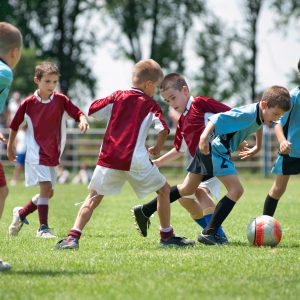
In the Blink of an Eye
One of the hardest parts of working in pediatric medicine is when tragedy happens. A small child losing the battle with cancer or suffering from complications of a complex medical condition. By far, the worst tragedies are the ones we call “in the blink of an eye” tragedies – the near fatal or fatal accidents that occur within minutes, sometimes seconds, of turning your head. Within the blink of an eye, your life can change forever. Stories of these types of accidents make your heart ache and cause you to hug your children a little tighter. As an ER pediatrician, I see these tragedies more often than most. So please take these important child safety tips to heart.
Child Safety Tips at Home
With the current COVID-19 situation, life is very different for many parents. You’re not only home with your children, trying to keep them entertained, somewhat educated, and well-adjusted. But most of you are also trying to work from home amidst all of these bizarre circumstances. You have so much going on in your life right now, despite being home more.
And we all get distracted. It happens.
Whether trying to answer a quick text or email or helping another child on the potty or changing a diaper, we have all taken our eyes off of our children. It’s unrealistic to think you could never be distracted.
Unfortunately, some of the most dangerous accidents occur within seconds. I am so passionate about child safety, education, and prevention because I know the toll these tragedies take on families.
There are important and necessary measures we can take to help prevent these horrible “in the blink of an eye” tragedies.
So let’s discuss some important child safety tips and preventative measures.
Top 4 Preventable Accidents
1. Drowning
Growing up and practicing medicine in South Florida, drowning prevention is a true passion of mine. Drowning is the leading cause of unintentional death in children ages 1-4 nationwide.
A child can drown is less than 2 inches of water and within minutes.
Always keep these tips in mind when your child is around any body of water (pools, lakes, the beach, etc.):
- Never overestimate your child’s swimming skills. No matter how well they swim, your child can panic and forget their skills within seconds. Any swimming child under the age of 4 must be within arms reach of an adult at all times.
- Invest in a pool fence. Many drownings occur because a child wanders outside and falls into the pool. A pool fence is the only way to ensure not only that your child is protected, but that other visiting children are as well.
- Never assume someone is watching your child. Never leave your child unsupervised near an unguarded pool. Many drownings occur during social gathers such as BBQs and swim parties. Parents have a false sense of security because there are other adults supervising. But this thoughts is a very dangerous one! Drowning is actually a silent struggle, many times going unnoticed, even with adult supervision.
- Alcohol and swimming never mix. It is imperative that whoever is supervising the pool has absolutely no distractions. Even one drink can cause you to become easily distracted.
2. Crush Injuries
Crush injuries can be very serious and possibly fatal. Make sure all of your furniture is anchored to the ground or wall. As infants start to explore and become more independent, they love to climb on furniture. Eliminate the possibility of any furniture piece falling onto them.
3. Burns
We see so many preventable burn injuries in the ER. When cooking with toddlers in the house, you should never use the front burners. Cooking on the back burners with the handles facing towards the back of the stove almost eliminates the chance of a small child reaching up for the handle and pulling the pot or pan down.
4. Toxic Ingestions
Did you know approximately 50,000 kids go to the ER every year because they got into medications that were left within reach. In fact, according to SafeKids, “almost every minute of every day there is a call to a poison control center because a young child got into a medicine.” Please take the right steps today to protect your children from accidental ingestions.
- Parents must teach their children what medicine is and that only a parent or caregiver should give it to them. Parents should never tell their children that medicine, including vitamins, is candy, even if it encourages your child to take it. Teach children the difference between a fruit snack gummy and medicine/vitamin gummies.
- Double check that medicines and vitamins are stored safely up, away, and out of sight of kids. Not just when you are home, but also when you travel or have medicines in your suitcase or purse. It is also something to consider when staying with friends or family, especially grandparents. I encourage you to have conversations with your guests that they too need to keep their medicines away from your children and pets.
- I can’t tell you how many parents fail to provide contact information for Poison Control or their pediatrician when they leave their children home with a babysitter, especially when they come in last minute.The phone number for the Poison Control Centers should be easily accessible in your own home and saved into your cell phones: (800)-222-1222.
Final Thoughts on Child Safety Tips
No one wants to be a statistic. And no one wants to see children in the ER for preventable accidents. Be as observant as possible during these strange times, and soak in all the family time you can!
~Dr. Katie




